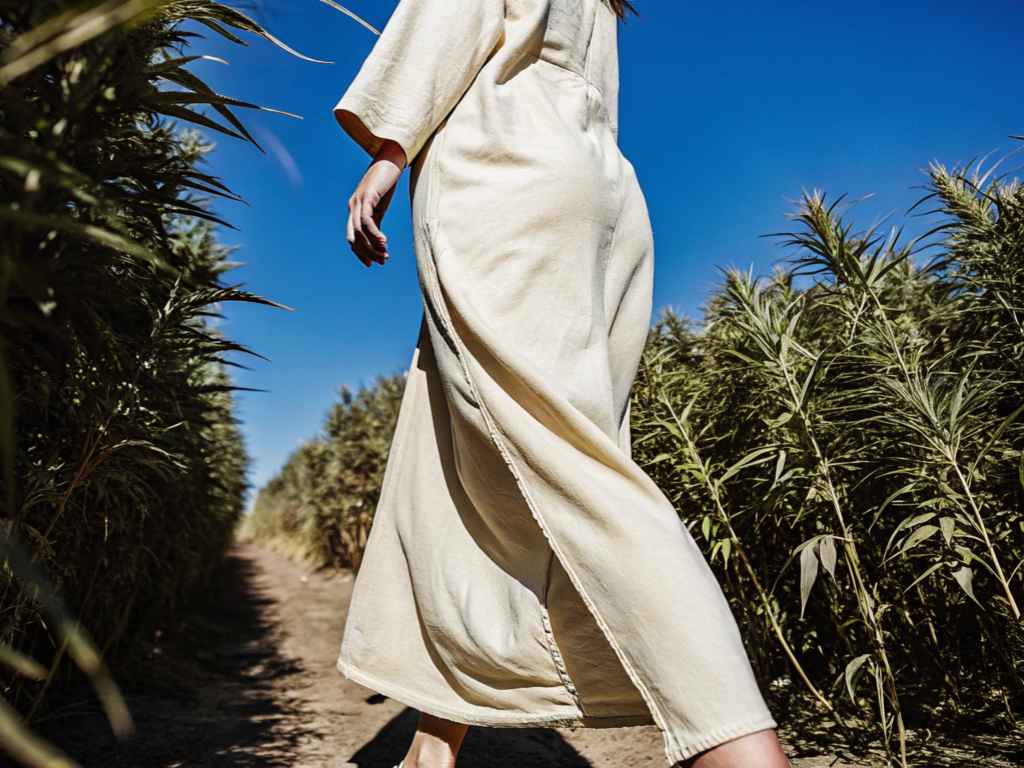Hemp clothing is becoming a symbol of eco-friendly living, with brands boasting “100% organic” on their labels. But is all hemp apparel truly organic from seed to shirt? As a manufacturer who has explored the full supply chain of hemp garments, I want to give you an honest, clear answer.
Not all hemp clothing is automatically 100% organic. While hemp is often grown with fewer chemicals, only certified organic hemp1—and responsible processing—ensure a garment is truly organic. Always check certifications and brand transparency before buying.
The first time I sourced hemp fabrics, I assumed they were all organic by nature. But I quickly learned that “hemp” and “organic hemp” aren’t always the same thing. Let’s dig into what makes hemp clothing truly organic, and what buyers should watch for before making a purchase.
What Makes Hemp Clothing an “Organic” Choice in Sustainable Fashion?
Hemp is often praised as a star in sustainable fashion, but what really makes it organic? Does the crop’s natural resilience guarantee a chemical-free final product?
Hemp can be grown with minimal pesticides, little water, and no synthetic fertilizers, making it one of the most eco-friendly fibers available. Certified organic hemp meets strict environmental and chemical use standards, but not all hemp is certified.
How is hemp grown and why is it considered environmentally friendly?
Hemp plants are naturally hardy. They resist most pests and diseases, so farmers rarely need chemical sprays. The roots improve soil structure, and the crop grows quickly—even on marginal land.
| Hemp Farming Benefit | Description |
|---|---|
| Water usage | Very low—hemp needs less water than cotton |
| Chemicals needed | Few—minimal to no pesticides or fertilizers |
| Soil health | Improves due to deep roots and crop rotation |
| Carbon capture | Absorbs more CO₂ per acre than most crops |
What certifications prove that hemp clothing is genuinely organic?
Truly organic hemp must be certified by independent agencies. Top certifications include:
- GOTS (Global Organic Textile Standard)2
- USDA Organic
- EU Organic Certification
Each covers not just farming, but also processing, dyeing, and supply chain transparency.
The Layers of “Organic” in Hemp
- Farm Level: Certification guarantees no prohibited pesticides or GMO seeds.
- Processing: Only safe, eco-friendly chemicals can be used to turn raw hemp into fabric.
- Dyeing: Must avoid toxic dyes or finishes to maintain the organic label.
- Final Product: Brands must ensure traceability from farm to garment—true transparency is rare, but crucial.
Is All Hemp Clothing Automatically 100% Organic?
It’s tempting to think all hemp clothing is organic because of how the plant grows. The reality is more complex.
Hemp’s eco-friendly reputation does not guarantee that every garment is 100% organic. Only hemp that’s certified at both the farming and processing stages can be called truly organic. Non-certified or conventionally processed hemp can include synthetic chemicals or harmful dyes.
What are the differences between conventional hemp and certified organic hemp?
| Feature | Conventional Hemp | Certified Organic Hemp |
|---|---|---|
| Farming chemicals | May use some pesticides | Prohibits synthetic chemicals |
| GMO seeds | Possible | Not allowed |
| Processing | May use harsh chemicals | Only eco-friendly allowed |
| Certification | None | GOTS, USDA, EU Organic |
Can processing or dyeing make hemp clothing non-organic?
Yes. Even if the hemp crop is organic, using toxic dyes, formaldehyde finishes, or harsh bleaches during manufacturing can strip away the organic status. The final product may lose its organic label if the whole supply chain isn’t certified.
Hidden Pitfalls in the Hemp Supply Chain
- Blending: Many brands blend hemp with conventional cotton or synthetics, diluting the organic content.
- Dye Houses: Processing facilities sometimes use prohibited chemicals to improve softness or color.
- “Greenwashing”: Some garments are labeled “natural” or “organic” without certification or supply chain proof. As a buyer, I always check for documentation.
How Does Hemp Compare to Other Organic Clothing Fabrics?
Hemp, organic cotton, and bamboo all claim eco-friendly status. Which one stands out, and why?
Hemp is generally more sustainable than organic cotton or bamboo because of its low water use and minimal need for chemicals. However, the comfort and durability of each fabric depend on the quality, processing, and blending.
Is hemp more sustainable than organic cotton or bamboo?
| Sustainability Factor | Hemp | Organic Cotton | Bamboo |
|---|---|---|---|
| Water usage | Very low | Moderate | Moderate to low |
| Chemical inputs | Minimal | Low (if certified) | Can be high or low |
| Crop yield | High per acre | Lower | High |
| Processing impact | Moderate | Low | Sometimes high |
Hemp’s main advantage is its natural resistance to pests and ability to improve soil health. However, closed-loop bamboo processing can rival hemp’s eco-friendliness—if managed properly.
Which type of organic clothing offers better durability and comfort?
Hemp fabric is very strong and becomes softer over time. Organic cotton is usually softer at first touch. Bamboo is naturally silky and drapes well.
| Fabric | Durability | Comfort (First Wear) | Gets Softer Over Time | Best For |
|---|---|---|---|---|
| Hemp | Excellent | Moderate | Yes | Workwear, casual wear |
| Organic Cotton | Good | Excellent | Slightly | Everyday basics |
| Bamboo | Fair | Very High | Somewhat | Flowy, lightweight |
Making the Right Choice for You
- Workwear: Hemp’s durability is unmatched—great for jackets or pants.
- Summer Wear: Bamboo and organic cotton offer superior softness and breathability.
- Longevity: Hemp garments can last for years with minimal fading or pilling.
- Eco Impact: Consider the full supply chain, not just the raw fiber.
What Are the Benefits of Choosing Organic Hemp Clothing?
Why choose organic hemp over other options? Beyond its green reputation, what can it actually do for your daily life?
Organic hemp clothing offers natural antibacterial properties3, UV protection, and exceptional breathability. It is well-tolerated by sensitive skin and gets more comfortable with every wash.
Does hemp clothing offer natural antibacterial or UV-resistant properties?
Yes. Hemp’s fibers are naturally resistant to bacteria and fungi, so the fabric stays fresher longer. It also provides strong protection from UV rays—studies show hemp can block up to 95% of harmful radiation, better than many other fabrics.
Is organic hemp clothing better for people with sensitive skin?
Hemp fabric has a rougher texture when new, but softens quickly with washing. It doesn’t retain chemical residues when processed organically, so it’s unlikely to cause irritation or allergies. Many with eczema or sensitive skin report excellent results with hemp clothing.
Science-Backed Functional Benefits
- Antibacterial: Lab studies confirm hemp resists bacterial growth, reducing odor even in hot weather.
- UV Protection: The dense fiber structure acts as a natural sunblock—ideal for outdoor wear.
- Hypoallergenic: Pure, organic hemp rarely causes rashes or itching, making it safe for babies or allergy sufferers.
- Thermal Regulation: Hemp’s breathability helps keep skin cool in summer and insulates in winter.
How to Shop Smart: Identifying True Organic Hemp Clothing
With so much “green” marketing, how can you be sure what you’re buying is truly organic?
Look for trusted third-party certifications like GOTS or USDA Organic, check the label for high hemp content, and research the brand’s transparency before buying.
Which labels or certifications should buyers look for?
- GOTS (Global Organic Textile Standard): The gold standard, covering the entire production chain.
- USDA Organic: Recognized for agricultural purity in the US.
- EU Organic Certification: Strict guidelines for Europe.
Brands with these certifications display them clearly—if you can’t find certification details, be skeptical.
Are there trusted brands known for selling 100% organic hemp clothing?
A few reputable brands lead the way:
| Brand | Certification | Product Focus | Transparency |
|---|---|---|---|
| Patagonia | GOTS, Fair Trade | Outdoor apparel | Very high |
| Thought Clothing | GOTS | Everyday fashion | High |
| Jungmaven | Not always GOTS, but very transparent | Basics, casual | High |
The Smart Shopper’s Checklist
- Ask for proof: Real brands show batch numbers and certification docs.
- Inspect blend ratios: 100% hemp is rare—watch for blends with organic cotton for best comfort.
- Transparency: Trust brands that explain their supply chain, not just market “eco” slogans.
Conclusion
Not all hemp clothing is 100% organic. Only certified products—grown, processed, and dyed under strict standards—can claim true organic status. Shop wisely by checking certifications, blends, and brand transparency to enjoy all the benefits hemp clothing has to offer.
-
Understanding certified organic hemp is crucial for making informed purchases and supporting sustainable practices in fashion. ↩
-
GOTS certification ensures high environmental and social criteria in textile production, making it essential for eco-conscious consumers. ↩
-
Exploring the antibacterial properties of hemp can reveal its benefits for health and hygiene, especially for sensitive skin. ↩







